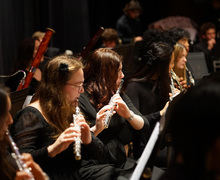SU Rising brings awareness of relationship violence, highlights improved sexual assault services
Andre Solomon | Contributing Photographer
About 50 community members attended SU Rising, which ended with a candlelight vigil and moment of silence to remember and honor victims of sexual and relationship violence.
The Syracuse University community presented a new, unified front to battle sexual and relationship violence Friday evening.
SU Rising is an annual candlelight vigil and rally held in Hendricks Chapel to bring awareness to sexual and relationship violence. The event also highlighted SU’s newly centralized, reinforced, realigned sexual assault services.
The event featured remarks and performances by organizations including Students Advocating for Sexual Safety and Empowerment, SU Zinda Fusion Dance Team, A Men’s Issue and the SU Counseling Center and the Office of Health Promotion. It concluded with a candlelight vigil and moment of silence.
SU Rising began as a response to One Billion Rising, the biggest mass action to end violence against women in history. Eve Ensler, author of the Vagina Monologues, founded One Billion Rising in 2011 in reaction to the fatal gang rape of a 23-year-old New Delhi student.
Ensler visited SU on Oct. 15, 2014, and S.I. Newhouse School of Public Communications Professor Tula Goenka said it was inspiring to see Ensler speak and exhibit how one person has the power to mobilize change.
“Rapes happened here before the fact and they happened after,” Goenka said. “Nothing changed. There was no discussion of here — the focus was far away.”
Eventually, the discussion became focused at SU, partly due to Chancellor Kent Syverud’s May 30 announcement of the realignment of sexual assault services. In what Goenka called a “grand swell” of student pushback, protests and petitions to the realignment, the administration realized this as an opportunity to improve services.
Syverud appointed students and faculty members, including Goenka, to be part of the Chancellor’s Workgroup on Sexual Violence Prevention, Education and Advocacy. The group was tasked with creating a report identifying areas that could be improved in campus and community culture regarding sexual and relationship violence.
Goenka said it became obvious that previous Advocacy Center services were often unable to fully meet all student needs. “It wasn’t enough. It needed more people, more resources and a more defined idea of what needs to be done,” she said.
If an incident of sexual assault happened, it was usually after-hours. The student would have to report the incident to the Department of Public Safety that evening. The next day they would have to report the incident to various services including the Advocacy Center, Counseling Center and Vera House in order to get the full support they needed, she said.
“The person assaulted would experience a re-victimization by having to tell their story and live their trauma over and over again,” Goenka said. “That has since been streamlined.”
Goenka said that a problem that she saw with sexual assault response services was its bias toward white, heterosexual students. There were groups including international, disabled, minority, LBGTQ students, students living off-campus or studying abroad that were not being given the response services they needed.
“Matters regarding these students weren’t really being discussed, and we realized we have to start talking about that and dealing with it in a bigger context,” Goenka said. “What the realignment of Advocacy Center services actually did was break the silence. Now we can continue to have these conversations in public, and I think that’s a good thing.”
Goenka said that another key improvement made to the sexual assault services is confidential services. With the realignment of the services, the culminated Counseling Center is now able to offer privileged and confidential services that the Advocacy Center could not.
As a non-privileged resource, the Advocacy Center was required to report information shared by a student, such as the nature, date, time and general location of an incident. The Counseling Center, a privileged resource, allows information a student provides to remain confidential, according to a June 4 fact sheet released by SU regarding the realignment of services.
Carrie Brown is a member of the sexual violence response team, a privileged and confidential resource at the Counseling Center. At SU Rising, Brown spoke about the Counseling Center’s free, completely confidential services for victims of sexual and relationship violence.
Brown said the realignment has shed a light on the bigger issue of sexual violence. She said that she was glad to see the campus community come together during the realignment, in turn educating students about the details of response services offered.
“The transition has been difficult, but the good thing is that it’s brought more eyes to the issues of sexual violence services on and off campus,” Brown said.
Jill Sneider, SU’s sexual and relationship violence prevention coordinator, agreed that there has been an increased awareness regarding sexual assault services.
She said that this year’s SU Rising was an event that was important because it focuses on assault violence specifically in terms of prevention and not blaming victims.
“It’s really a time to say no more — it’s a rise to action,” Sneider said. “Hopefully the increased awareness on these issues will bring people together to make a difference. It’s about time.”
Published on February 16, 2015 at 12:01 am
Contact Lydia: lawilson@syr.edu





